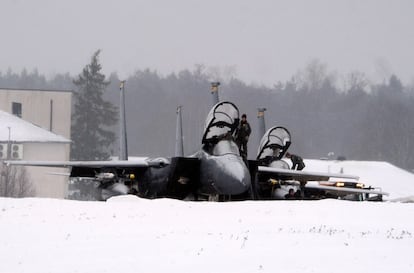NATO will deploy more troops in the east if Moscow continues its military escalation
In documents accessed by EL PAÍS, the Alliance also calls for a pact to bring an end to cyberattacks

Given the Russian complaints over the deployment of allied troops ever nearer its borders, Washington states in its written response to Moscow – to which EL PAÍS has had access – that the presence of US and NATO forces in the east of Europe is “limited, proportionate, and in full compliance with its commitments under the NATO-Russia Founding Act.”
The United States alleges that it has continued to refrain from “‘the additional permanent stationing of substantial combat forces’ as well as from placing nuclear weapons in Eastern European states,” as it promised, and that North American troops are currently at a quarter of what they were at the end of the Cold War. It warns, however, that ulterior increases in the positions of Russian forces or aggressions against Ukraine will “force the United States and our Allies to strengthen our defensive posture.”
NATO also combines this outstretched hand with a warning. On the one hand, it offers Moscow a full reestablishment of its relations, reopening its respective embassies, which have been closed since last October, and assures that NATO “is not seeking confrontation.” But it adds that it cannot compromise the principles upon which Euro-Atlantic security is based, including Article 5 of the founding Washington Treaty, according to which “an attack against one Ally shall be considered an attack against all. We will take all necessary measures to defend and protect our Allies, and will not compromise on our ability to do so,” it warns.
Like the American response (detailed here), that of NATO proposes a series of trust-building measures, among which is the Russian proposal of establishing a civil hotline for emergency contacts, as well as making full use of military communication channels to promote foreseeability and transparency, as well as reducing risks. While the document from Washington accuses Russia of having carried out major military exercises without prior warning, NATO proposes reducing the limit of forces from which maneuvers should be notified. It also proposes consultations in order to avoid incidents in the air and the sea, while Washington denounces the dangerous maneuvers of Russian fighter jets over Allied vessels in international waters or the violation of free movement in the Black Sea and the Sea of Azov, to the northeast of Crimea.
NATO is calling on Russia to reapply the Treaty on Conventional Armed Forces in Europe (CFE), once again participating in the consultation group and providing detailed information about its troops, as set out in the treaty.

Click here to download the full documents
NATO’s concerns are not limited to conventional war. The Alliance proposes the promotion of “a free, open, and secure cyberspace, by consulting on ways to reduce threats in the cyber domain, by pursuing efforts to enhance stability by adhering to international legal obligations and voluntary norms of responsible state behavior in cyberspace; and all states desisting from malicious cyber activities.” This is not just a rhetorical demand: in the midst of the ramping up of tensions, Ukraine has been the victim of cyberattacks attributed to Russia.
NATO also proposes to Moscow holding talks on reducing threats to space systems and promoting responsible behavior in space. Specifically, it calls on Russia to refrain from conducting anti-satellite tests, “which create large amounts of debris.” All of these issues should be dealt with during a series of video-conferences, after the NATO-Russia Council met on January 12 for the first time in nearly two years.
Caution or pessimism
Judging by its tone, NATO is approaching its conversations with Russia with great caution, if not pessimism. “For more than 30 years, NATO has worked to build a partnership with Russia,” the document complains. Not only did it “extend the hand of friendship” at the end of the Cold War, it argues, but it also signed the NATO-Russia Founding Act and created the NATO-Russia Council. “No other partner has been offered a comparable relationship or a similar institutional framework,” the NATO document continues. “Yet Russia has broken the trust at the core of our cooperation and challenged the fundamental principles of the global and Euro-Atlantic security architecture,” the text complains.
“We continue to aspire to a constructive relationship with Russia when its actions make that possible,” the document continues. “We encourage Russia to engage in meaningful dialogue on issues of concern to all members of the NATO-Russia council in order to achieve tangible outcomes.” But it warns: “The reversal of Russia’s military build-up in and around Ukraine will be essential for substantive progress.”
Tu suscripción se está usando en otro dispositivo
¿Quieres añadir otro usuario a tu suscripción?
Si continúas leyendo en este dispositivo, no se podrá leer en el otro.
FlechaTu suscripción se está usando en otro dispositivo y solo puedes acceder a EL PAÍS desde un dispositivo a la vez.
Si quieres compartir tu cuenta, cambia tu suscripción a la modalidad Premium, así podrás añadir otro usuario. Cada uno accederá con su propia cuenta de email, lo que os permitirá personalizar vuestra experiencia en EL PAÍS.
¿Tienes una suscripción de empresa? Accede aquí para contratar más cuentas.
En el caso de no saber quién está usando tu cuenta, te recomendamos cambiar tu contraseña aquí.
Si decides continuar compartiendo tu cuenta, este mensaje se mostrará en tu dispositivo y en el de la otra persona que está usando tu cuenta de forma indefinida, afectando a tu experiencia de lectura. Puedes consultar aquí los términos y condiciones de la suscripción digital.








































